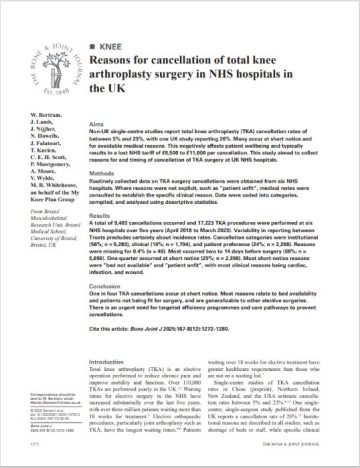My Knee Plan
Theme Surgical and orthopaedic innovation
Workstream Interventions to improve patient outcomes after surgery
Status: This project is ongoing
Over 110,000 total knee replacements (TKRs) are performed in the UK every year. One in five patients are dissatisfied with their outcome and/or have chronic pain after surgery. Some patients feel abandoned after their surgery and have expressed a need for more advice and support. About 5% of patients will have their operation cancelled at short notice, usually for avoidable medical reasons, which can have a negative effect on quality of life and relationships with healthcare professionals.
Continuity of care (care consistently delivered by a named contact) is important for patient satisfaction and has been shown to improve outcomes in several clinical specialties. Using this approach could help us improve patient outcomes and satisfaction. This is because we would be providing them with tailored treatment, support and education. However, it is an approach that has not been evaluated within orthopaedics.
Project aims
The aim of this project was for a team of researchers, healthcare professionals and patients to work together to produce a care plan for patients having a total knee replacement. Our aim was to develop a plan that could be delivered to patients before and after surgery, by a named contact.
The project plan was:
- Review the literature to look for previous evaluations of interventions that took place before and after surgery for patients undergoing primary TKR
- Collect data from three NHS hospitals to identify medically avoidable reasons why TKR operations are cancelled and inform how a named contact can contribute to medical optimisation and help manage a patient’s expectations
- Interview 20 patients and four focus groups with healthcare professionals to explore the needs and preferences of patients undergoing TKR and the healthcare professionals who provide care for these patients
- Collate our findings and present them to a panel of at least 100 patients and 50 healthcare professionals for review
Our co-production group
A group of 5 researchers, 5 healthcare professionals and 5 patients – the co-production group – was formed to collaborate on producing the care plan for patients having a total knee replacement. They met regularly throughout the project to review and discuss the data we collected. The results of these discussions informed the design of the care plan.

Please click here if you would like to:
- Find out more about our co-production group
- Read about their views on co-production
Our work so far
We collected information on the timing of, and reasons for, cancellation of total knee replacement surgery at 6 NHS hospitals in England, Scotland, Wales and Northern Ireland, over a period of 5 years between April 2018 and Mar 2023.
We found that, at the 6 hospitals over the 5 years, 17,223 total knee replacement operations were completed and 9,403 cancelled – more than previously thought. A quarter of the cancellations were less than 24 hours before surgery, and nearly one third were within 2 to14 days.
Lack of available hospital beds and patients being unfit for surgery were the most common reasons for short-notice cancellations. Many of these cancellations could have been avoided with advance planning.
Heart problems, infections and wounds were the main health reasons for cancelling surgery. With the right medical care while people wait for their operation, many patients could be supported to be medically fit for surgery, and cancellations avoided.
These findings highlight the need to provide better information and support for patients while they wait for knee replacement surgery, which is part of the aim of our wider project.
What we hope to achieve
We have produced a care plan for TKR patients, from the time they’re booked in for surgery until they’ve recovered. We hope this plan will help prevent cancellation of their operation and help them recover.
We have also adapted the plan for people having total hip replacement.
